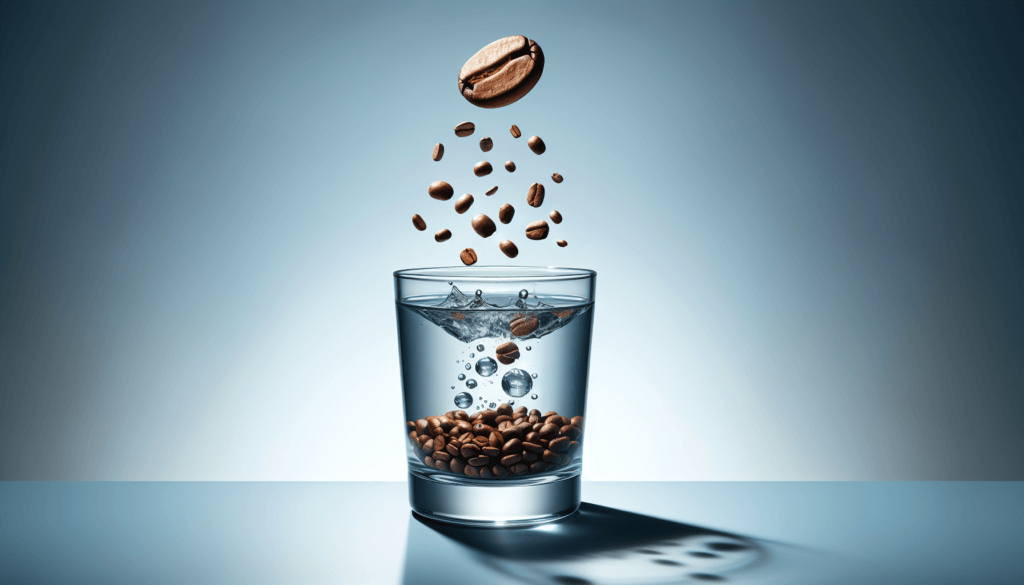In this article, we explore the intriguing question of whether it is possible to flush out caffeine from your body at a faster rate. Coffee lovers are all too familiar with the energetic boost that caffeine provides, but what happens when you want to mitigate its effects or simply reduce your intake? Is there a way to expedite the process of eliminating caffeine from your system? Join us as we delve into this topic and uncover some fascinating insights. So, can you flush out caffeine faster? Let’s find out!

Caffeine Removal from the Body
Caffeine is a widely consumed stimulant found in various beverages and foods. While it provides a temporary energy boost, many people may want to flush caffeine out of their systems due to its potential side effects, such as restlessness, increased heart rate, and disrupted sleep patterns. In this article, we will explore the metabolism of caffeine, factors that affect its metabolism, its half-life, and methods to accelerate its removal from the body.
Metabolism of Caffeine
Absorption of Caffeine
After consuming caffeine-containing products, the caffeine is rapidly absorbed into the bloodstream through the stomach and small intestine. From there, it travels to various organs, including the brain, where it exerts its stimulant effects.
Conversion to Metabolites
In the liver, caffeine undergoes extensive metabolism, primarily through three main pathways. The major metabolic pathway involves the enzyme cytochrome P450 1A2 (CYP1A2), which converts caffeine into three primary metabolites: paraxanthine, theobromine, and theophylline. Each of these metabolites has its own physiological effects.
Enzymes Involved in Metabolism
Apart from CYP1A2, other enzymes such as cytochrome P450 2E1 (CYP2E1) and xanthine oxidase also contribute to the breakdown of caffeine. Genetic variations in these enzymes can influence individual differences in caffeine metabolism rates.

Factors Affecting Caffeine Metabolism
Several factors can significantly impact the metabolism of caffeine in the body:
Genetics
Genetic variations in the enzymes involved in caffeine metabolism can affect how quickly or slowly an individual can process caffeine. Some individuals may have genetic variations that result in rapid metabolism, while others may have slower metabolism rates.
Age
The age of an individual can also influence caffeine metabolism. As we age, the liver’s function and enzyme activity may decline, leading to slower caffeine metabolism.
Liver Function
The liver plays a crucial role in metabolizing caffeine, and any impairments in liver function can affect its metabolism. Individuals with liver diseases or conditions may experience slower caffeine metabolism.
Medications
Certain medications, such as some antidepressants and antibiotics, can interfere with caffeine metabolism. These medications may inhibit the activity of specific enzymes, leading to a slower breakdown of caffeine.
Pregnancy
During pregnancy, caffeine metabolism can be significantly affected. The metabolism rate slows down, as the body prioritizes the baby’s safety. Therefore, pregnant women are often advised to limit their caffeine intake.
Smoking
Smoking has been found to increase the metabolism of caffeine. The chemicals in tobacco smoke induce the activity of specific enzymes responsible for caffeine metabolism, leading to a faster clearance of caffeine from the body.
Diet
The components of an individual’s diet, such as certain foods and beverages, can affect caffeine metabolism. Studies have suggested that substances like grapefruit juice and cruciferous vegetables may alter the activity of enzymes involved in caffeine metabolism.
Caffeine Half-life
Definition of Half-life
Half-life refers to the time it takes for the concentration of a substance in the body to reduce by half. In the case of caffeine, the half-life represents the duration it takes for the body to eliminate half of the initial caffeine dose.
Average Caffeine Half-life
The average half-life of caffeine in healthy adults is approximately 3 to 5 hours. This means that if you consume 200 mg of caffeine, after 3 to 5 hours, approximately 100 mg will remain in your body.
Factors Influencing Caffeine Half-life
Several factors can influence caffeine’s half-life, including individual variations in metabolism, age, liver function, and co-administration of medications. Understanding these factors can help you better estimate how long caffeine will stay in your system.

Methods to Flush Caffeine Out of the Body
If you wish to accelerate the removal of caffeine from your body, several methods can help:
Hydration
Maintaining proper hydration is essential for efficient caffeine elimination. Drinking sufficient water can support kidney function and urine production, facilitating the excretion of caffeine metabolites.
Physical Exercise
Engaging in physical exercise can boost your metabolism and enhance the elimination of caffeine. Aerobic exercises, such as running or cycling, are particularly effective in improving caffeine metabolism.
Increasing Urine Production
Certain foods and beverages possess diuretic properties and can increase urine production. Examples include herbal teas, watermelon, celery, and cucumber. However, excessive diuresis can lead to dehydration, so it’s important to maintain a balance.
Avoiding Additional Caffeine Intake
To flush out caffeine from your system, it is crucial to avoid consuming additional caffeine-containing products. Be mindful of hidden sources of caffeine, such as chocolate, energy drinks, and some medications.
Using Antioxidant-rich Foods
Incorporating antioxidant-rich foods into your diet can potentially aid in caffeine elimination. Antioxidants help neutralize and eliminate toxins, including caffeine metabolites. Brightly colored fruits and vegetables, green tea, and dark chocolate are good sources of antioxidants.
Getting Enough Sleep
Getting sufficient sleep allows your body to perform its natural detoxification processes effectively. Adequate sleep can support overall metabolic function and assist in flushing out caffeine from your system.
Hydration
Importance of Hydration
Proper hydration is essential for maintaining optimal bodily functions. It aids in digestion, circulation, temperature regulation, and the elimination of waste, including caffeine and its metabolites.
Drinking Sufficient Water
Water is the best and most accessible hydrating beverage. Aim to drink at least eight 8-ounce glasses of water daily to stay adequately hydrated and support caffeine elimination.
Other Hydrating Beverages
While water is the top choice for hydration, other beverages like herbal tea, fruit-infused water, and electrolyte-rich drinks can also contribute to your overall fluid intake. However, be cautious of caffeinated drinks and their potential to counteract your efforts to flush out caffeine.

Physical Exercise
Effects of Exercise on Caffeine Metabolism
Exercise not only has numerous health benefits but can also impact caffeine metabolism. Physical activity increases blood flow, oxygen delivery, and metabolic rate, which can enhance the breakdown and elimination of caffeine from the body.
Recommended Exercise Intensity and Duration
To optimize caffeine metabolism, engage in moderate to vigorous aerobic exercises for at least 30 minutes a day, most days of the week. This can include activities such as brisk walking, jogging, swimming, or cycling.
Increasing Urine Production
Diuretic Properties of Certain Foods and Beverages
Certain foods and beverages possess diuretic properties, meaning they increase urine production. Examples include herbal teas, watermelon, celery, and cucumber. Incorporating these into your diet can help flush out caffeine and its metabolites.
Natural Diuretics
Natural diuretics, such as dandelion root, green tea, and nettle leaf, can also promote urine production. However, it’s important to consume these in moderation and maintain a proper balance of fluids to prevent dehydration.
Potential Risks of Excessive Diuresis
While increasing urine production can aid in the elimination of caffeine, excessive diuresis can lead to dehydration. To avoid this, ensure you monitor your fluid intake and consume adequate amounts of water and hydrating beverages.

Avoiding Additional Caffeine Intake
Identifying Sources of Caffeine
To flush out caffeine effectively, it is crucial to identify all potential sources of caffeine in your diet. Read labels carefully and be aware of products that may contain hidden caffeine, such as certain medications and chocolate.
Strategies to Reduce Consumption
Once you have identified your sources of caffeine, consider implementing strategies to reduce your intake. Gradually decrease the amount of caffeine-containing products you consume, and explore alternative non-caffeinated options.
Getting Enough Sleep
Impact of Sleep on Caffeine Metabolism
Adequate sleep is vital for overall health and well-being, including caffeine metabolism. During sleep, the body undergoes various restorative processes, including detoxification and metabolic regulation, which can aid in flushing out caffeine.
Tips for Better Sleep
To support caffeine elimination, establish a consistent sleep schedule and create a relaxing bedtime routine. Minimize exposure to electronic devices before sleep, ensure a comfortable sleep environment, and limit caffeine consumption in the evening.
In conclusion, while caffeine can provide a temporary energy boost, there are instances when you may want to flush it out of your system. Understanding the metabolism of caffeine, the factors that affect its metabolism, its half-life, and various methods to accelerate its removal from the body can help you make informed choices in managing your caffeine intake. Remember to prioritize your health and well-being by listening to your body and adopting suitable strategies to flush out caffeine if desired.


